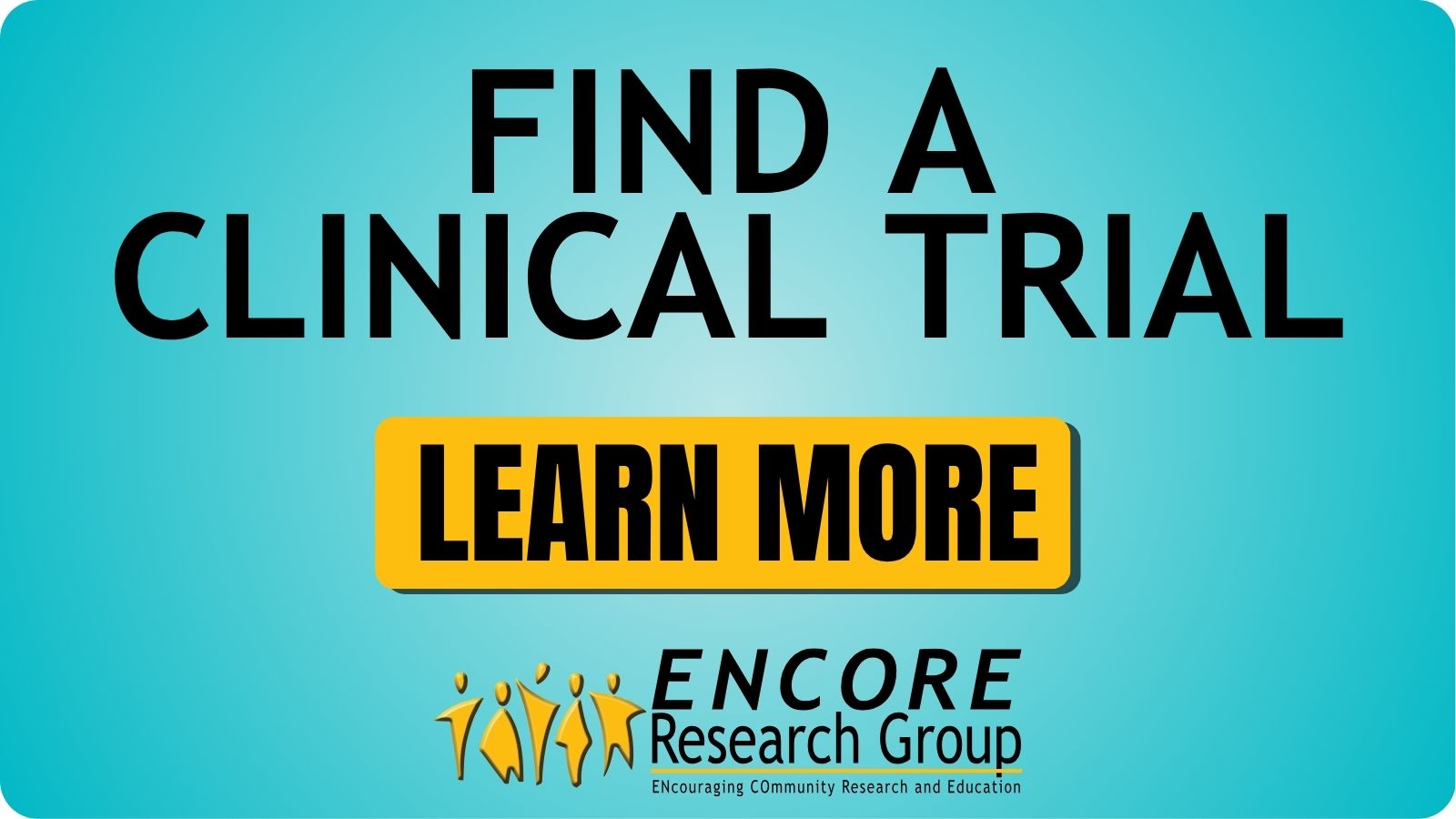Understanding Patient Advantages for Participating in Clinical Trials

Audio
As we peel back the curtain on clinical trials, Dr. Koren shares how choosing the right candidates is as critical as the research itself. Ethical considerations and the integrity of the studies take center stage. If you've ever pondered the real-world impact of being part of a clinical trial or wondered about the top-tier healthcare and cutting-edge treatments participants access, our candid discussion with Dr. Koren offers those answers and more. Join us for a conversation that's as much about connecting with the community as it is about demystifying the research process—where personal health narratives meet scientific rigor.
Be a part of advancing science by participating in clinical research
Recording Date: January 29, 2024
Powered by ENCORE Research Group
Music: Storyblocks - Corporate Inspired
Transcripts
Narrator: 0:00
Welcome to the MedEvidence Monday Minute Radio Show, hosted by Kevin Gettings of WSOS St. Augustine Radio and powered by ENCORE Research Group. Each Monday morning, Dr. Michael Koren calls in to bring you the latest medical updates with insightful discussions. MedEvidence is where we help you navigate the real truth behind medical research, with both a clinical and research perspective. So sit back, relax and get ready to learn about the truth behind the data in medicine and health care. This is MedEvidence.
Kevin Geddings: 0:30
Dr. Koren, did you have the opportunity to see that Capital One commercial where John Travolta plays Santa Claus?
Dr. Michael Koren: 0:36
I did.
Kevin Geddings: 0:37
Have you seen that? And then it ends with him doing that dance from Saturday Night Fever.
Dr. Michael Koren: 0:43
Yeah, yeah. It's pretty good right we haven't seen him much on the big screen lately, but I guess that was his opportunity to be on the little screen.
Kevin Geddings: 0:50
Yeah, no kidding. Well, he's in his 70s and he still has the dance moves. He didn't totally forget all of them, so that was encouraging.
Dr. Michael Koren: 0:57
He in Ocala, if I'm not mistaken, yeah right?
Kevin Geddings: 1:00
Yeah, he spends a lot of time, I guess, in Ocala, In one of those fly-in neighborhoods where you own your own plane and you landed in your backyard. You're more of a helicopter guy, right?
Dr. Michael Koren: 1:12
Although I did coincidentally have dinner on a table next to him in California about 30 years ago.
Kevin Geddings: 1:22
Wow.
Dr. Michael Koren: 1:24
I can't say I know him, but I did watch him have dinner.
Kevin Geddings: 1:28
And you see.
Dr. Michael Koren: 1:29
Actually, the other time I was within probably about 15 yards. He was at the Super Bowl. When the Super Bowl was in Jacksonville, I was there and he was there in the same section. So there you go. Those are my two John Travolta sightings.
Kevin Geddings: 1:42
I think that pretty much qualifies you as best friends. There's been a lot of John Travolta sightings in downtown St. Augustine when his wife was still alive. She apparently liked to go to downtown St. Augustine but they would dress in a clandestine sort of way. But they enjoyed coming to St. Augustine. Dr. Michael Koren is here with us live on the radio. He joins us on Monday mornings and we appreciate him taking time out of his busy schedule. He, of course, is a medical doctor, a cardiologist, research scientist as well, and heads up the show at ENCORE Research Center where they do leading edge medical research and increasingly especially if we look back, say, 15 years ago increasingly people understand how great it is to participate in clinical trials and leading edge medical research right.
Dr. Michael Koren: 2:30
Yeah, yeah, it's interesting. People are discovering this. People are finding that there's huge value to them from a number of different points of view. And we're getting more and more requests to be part of it. In fact, at times you have to tell people no, and that's become a little bit of an interesting phenomenon for us. Sometimes you have to tell people no because they don't fit studies, or we tell people no because they're too healthy. That's our favorite reason to tell people no. And sometimes you actually have to tell people no because they're already in a study and the rules are that you should only be in one study at a time. There's some exceptions to that rule, but for the most part that's true, and the reason for that is because we only want to study one medical situation at a time, and if people were to get involved in multiple studies, it'd be very difficult for us to tease out the effects of any particular intervention.
Kevin Geddings: 3:19
Yeah, that makes a lot of sense and of course, people are interested in doing this. I know a lot of you will say, well, yeah, they want to be a part of a medical trial because they will get paid or compensated for their travel or whatever. I would argue that no people want to be a part of this, because if you've been a part of one, like I have been you get to experience some of the best health care you've ever had your entire life.
Dr. Michael Koren: 3:39
Absolutely, but there's multiple reasons that people get involved. Compensation is a reason for some people but, to your point, for the majority that's not true. The majority is to get exposure to the team and learn from the expertise of the team, learn more about your condition, at times getting medication that you wouldn't otherwise get. At times getting testing for free that you never get otherwise. So there are a lot of factors. The compensation in some cases could be a little bit of a problem if people are just motivated by that because we don't want them to go to multiple places to be compensed for their clinical trial involvement without telling us. So it's a little bit of an issue, but fortunately it's an extremely rare occasion. But again, we do have the responsibility to make sure that people follow the rules when they get involved in clinical research.
Kevin Geddings: 4:32
That's Dr. Michael Koren, by the way, with ENCORE Research Group and you can get involved in leading edge medical research right here in our part of Northeast Florida. They have offices right at UF Flagler Health Hospital, right on 312 near US-1. Learn more by going to ENCOREdocs. com. That's E-N-C-O-R-E, ENCOREdocs. com, and the telephone number here locally 904-730-0166. That's 904-730-0166. And I know we'd spent a lot of time if we went through the entire list, Dr. Koren, but what are some trials that you guys are actively recruiting for right now here in St. John's County?
Dr. Michael Koren: 5:11
Well, I would ask everybody to focus on congestive heart failure. So if you have congestive heart failure and you're within the sound of my voice or you know somebody with it, it would behoove them to learn more about what we're doing. Congestive heart failure is a really interesting problem for people in that it has a horrible prognosis if you don't treat it. If you treat it, you can do extraordinarily well, and people often get confused with the diagnosis. It's a complex diagnosis. They often get on the wrong medications and being part of a clinical trial will help people know that they're on the right track. And, of course, we have cutting-edge drugs and technologies. We're actually exploring apps and other ways of using electronics to keep people out of trouble about congestive heart failure. So I would it really boost people and I would encourage people with the diagnosis of CHF or congestive heart failure or refer somebody to us that has that problem so they can learn about their condition and make sure that they're maximizing the benefits that are out there.
Kevin Geddings: 6:09
Strikes me as a baby boomer that we've made tremendous progress with congestive heart failure. I was raised by my grandparents. My grandfather passed away from that at a relatively young age and that was very common back in especially the 70s and in the 80s right?
Dr. Michael Koren: 6:24
Oh, no doubt back then the diagnosis of congestive heart failure was worse than cancer, so the level was worse. But we change that. And again, there's a lot that we can do. But people have to come in and identify themselves, and then we can actually help them quite a bit.
Kevin Geddings: 6:39
Well, if you're listening to us, if you're not dealing with congestive heart failure as a diagnosis but perhaps you have someone in your family who doesn't just about all of us would we would encourage you to learn more by going to ENCOREdocs. com. So yet, call this phone number because you're going to actually speak with a live person who knows what they're doing and they can help guide you and inform you. 904-730-0166 here locally. 904-730-0166 for Dr. Michael Koren and the team at ENCORE Research Center. Before we let you go, Dr. Koren, talk to us about the MedEvidence website. We want people to check that out too, MedEvidence. com
Dr. Michael Koren: 7:15
Sure. MedEvidence is our online platform and we coin it with the phrase the truth behind the data. I think that's so important. I think people understanding that everybody is making these crazy statements online and in other places that are not supported by the facts, and sometimes people just throw out the facts without putting them in context. So the whole purpose of that website is for people to understand what the data is and how that reflects the truth in healthcare and we do it in a number of different ways. The most popular way of doing it is having a discussion between physicians, and when two docs talk or physicians are communicating about an issue, you really get to the bottom line, get to the truth behind the data and you're not. You're not subject to people trying to influence you to sell a product or people trying to influence you to make their point of view, political and otherwise. So we would really encourage people to get the truth behind the data and check out the MedEvidence website.
Kevin Geddings: 8:15
Yeah, good information. It's very intuitive as a website, a lot of ways to access that information and you can trust it which is, to be honest, hard to find on the internet. Go to MedEvidence. com. That's MedEvidence. com, Dr. Michael Koren. We appreciate your time, sir, and we'll talk again next week.
Dr. Michael Koren: 8:31
Okay, that's great. Have a great week, Kevin.
Narrator: 8:34
Thanks for joining the MedEvidence podcast. To learn more, head over to MedEvidence. com or subscribe to our podcast on your favorite podcast platform.



